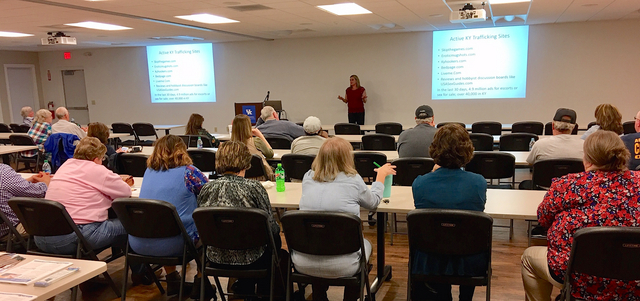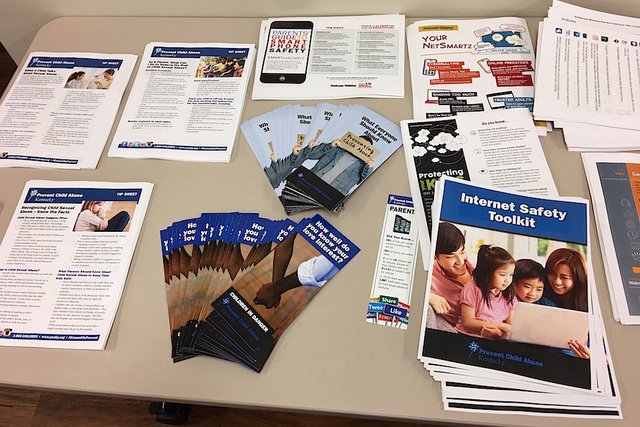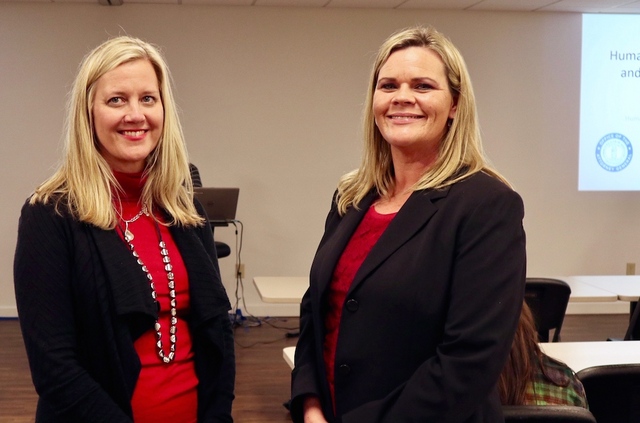| ||||||||||
Dr. Ronald P. Rogers CHIROPRACTOR Support for your body's natural healing capabilities 270-384-5554 Click here for details 


Columbia Gas Dept. GAS LEAK or GAS SMELL Contact Numbers 24 hrs/ 365 days 270-384-2006 or 9-1-1 Call before you dig Visit ColumbiaMagazine's Directory of Churches Addresses, times, phone numbers and more for churches in Adair County Find Great Stuff in ColumbiaMagazine's Classified Ads Antiques, Help Wanted, Autos, Real Estate, Legal Notices, More... 

|
Human Trafficking - it's not done the way you think "A common misconception about human trafficking comes from movies like "Taken," causing people to believe that traffickers kidnap or snatch victims off the street. The reality is that recruitment into trafficking is much more manipulative. Traffickers gain a victim's trust, gaining information and filling the needs of the victim, whether emotional, physical or financial. Victims are then isolated and when manipulation is no longer enough to maintain control, the physical violence begins. Call a tip in about sex or labor trafficking if you suspect it. In Kentucky, no minor can consent to commercial sexual activity (stripping, prostitution, or pornography) and anyone who suspects that a minor is involved in commercial sexual activity has a legal duty to report that suspicion to the Cabinet for Health and Family Services at 1-877-KYSAFE1. If there is an immediate danger, call 911 but do not try to intervene. Non-emergency tips may also be provided to the National Human Trafficking Hotline at 1-888-373-7888." By Linda Waggener, columbiamagazine.com Allyson Taylor, Director of the office of Child Abuse and Human Trafficking Prevention and Prosecution in the Office of the Attorney General, provided information to dispel the common misconceptions about human trafficking, how traffickers recruit victims, the indicators of trafficking, and how to report suspicions. Human Trafficking occurs when one person subjects another person to forced labor or services or commercial sexual activity through the use of force, fraud or coercion. On average, a sex trafficker makes a profit of about $1,000 per day on an adult victim and about $2,000 per day on a minor. Because of this increased profit from minors and because of their gullibility, they are at higher risk of being targeted by sex traffickers. Because of the anonymity of the online sex trade, the prevalence of sex trafficking increased almost 500% from 2010-2015. 300,000 US kids are sex trafficked within the United States every year. The average age of entry into the sex trade is 12-14 years old. Taylor said sex trafficking is growing across the country - it is a 32 billion dollar industry in the United States and happens in every county in Kentucky. Runaways, homeless youth, and kids in the juvenile justice or foster care systems are the most at risk. However, traffickers are using the internet to recruit and groom kids that otherwise would not fall into these at risk categories. Some of the sites human traffickers utilize to meet and recruit minors are: - Kik - Meetme - Fortnite - Facebook, Instagram, SnapChat - Webkinz - Minecraft - liveme Runaways and homeless youth are at very high risk - 1 in 3 teens on the street will participate in "survival sex" (the exchange of sexual activity for something they need to survive) within 48 hours of leaving home. Traffickers may use the internet to reach out and chat with kids, building a relationship and ultimately luring the child out of the house. Another practice traffickers use is "Sextortion". Through sextortion, the traffickers use fraud to convince the minor to send them a nude picture and then blackmail or extort the kid into other activities under the threat of sharing those pictures with others like parents, coaches, social media pages, etc. Another way sextortion is initiated is through the use of spyware, technology that allows the perpetrator to photograph and video the child without their knowledge, only to later use the images to extort the minor into further activities. Traveling youth sales crews are a form of labor trafficking of kids and is the second most commonly reported form of human trafficking in the United States. These crews are showing up in Kentucky regularly as well. They often operate under names like Youth in Action, Youth Alive, or even using the names of respected charitable organizations. Kids in these crews sell different items door to door, most often candy, cookies or magazines. The kids have to meet quotas before they are allowed to eat, sleep, etc. The trafficker in control is getting rich off the labor of the children, who are in a community they are not familiar with and have no trusted adult to turn to. The trafficker gains access to the kids by convincing their parents that this is a charitable organization and their child will be learning a skill and staying off the streets and out of trouble. Kids in the traveling youth sales crews are usually 8-14 years old. Taylor said, "These groups are becoming more prevalent in Kentucky and community members should trust their guts and make a call if a kid selling things at their door cannot give information beyond a script, is unaccompanied by any adults, or doesn't seem to have any connection to the community." Sex trafficking is the most common form of human trafficking. She said that pimping has become a "glamorous and profitable business" in this country which helps to desensitize kids to what pimping actually is, sex trafficking, and the harm it causes. For example, PGO is a brand of shoes and clothing that is being marketed to kids. PGO stands for "Pimpin' Goin' On." Red flags to watch for: frequent movement to multiple cities or states (though movement is not required for the crime of trafficking), has their ID withheld or only has a fake ID of an adult, in possession of multiple cell phones and/or hotel keys, is homeless or known to be extremely poor but suddenly has expensive things, is defensive or combative, will not make eye contact,, malnourished or has physical injuries. Another common indicator is branding, which is often in the form of a tattoo or carving, - dollar signs and diamonds are often included with the name or symbol of the trafficker - where they can be seen to show who they belong to. Bar code tattoos are also common according to Taylor - branding is meant to show ownership - the word "bitch" is sometimes included in the brand- Listen for lingo like "Daddy", "In the Life", "Stable", "Romeo", "Bottom" or "Bottom Bitch." There is no specific combination of indicators required and this list is not exhaustive, but these are common ones to be aware of. What to do if you encounter a young person you feel may be a victim of human trafficking: - Make the call 1-877-KYSAFE1 and share your suspicion, only a suspicion is required. If you are incorrect in your concerns, you cannot be held liable for making the report. Better safe than sorry, especially when it comes to juvenile trafficking victims. - If there is an immediate danger, call 911. - Follow up with a call to the National Human Trafficking Hotline at 1-888-373-7888. You can also refer an adult victim to the hotline. Adults can ask for help and resources without notification to law enforcement. For more information or to request training, contact Allyson Taylor, Director, Office of Child Abuse and Human Trafficking Prevention and Prosecution in the Office of the Attorney General, Allyson.Taylor@ky.gov; or see Mary Kate White, Victim Advocate for Adair County at the Children's Advocacy Center, Jamestown. This story was posted on 2019-02-07 09:14:08
Printable: this page is now automatically formatted for printing.
Have comments or corrections for this story? Use our contact form and let us know.
More articles from topic News:
GRAS: Kit Kat Calico has a home Electrical Shock Drowning a silent killer on lakes and waterways Rain and wind today, high 73F, dropping to 26F overnight 7-County Area Courts for Thu 7 Feb 2019 Letter: Believes bird is an American Goldfinch CAUD will meet Wednesday, 13 Feb 2019 Letter: Happy Birthday wishes to Elizabeth McCubbin GRAS report - this dog has found a home Little League signups every Mon/Wed evening in February Bevin administration files brief in Transfer Agreement case View even more articles in topic News |


|
||||||||
|
| ||||||||||
|
Quick Links to Popular Features
Looking for a story or picture? Try our Photo Archive or our Stories Archive for all the information that's appeared on ColumbiaMagazine.com. | ||||||||||
|
Contact us: Columbia Magazine and columbiamagazine.com are published by Linda Waggener and Pen Waggener, PO Box 906, Columbia, KY 42728. Please use our contact page, or send questions about technical issues with this site to webmaster@columbiamagazine.com. All logos and trademarks used on this site are property of their respective owners. All comments remain the property and responsibility of their posters, all articles and photos remain the property of their creators, and all the rest is copyright 1995-Present by Columbia Magazine. Privacy policy: use of this site requires no sharing of information. Voluntarily shared information may be published and made available to the public on this site and/or stored electronically. Anonymous submissions will be subject to additional verification. Cookies are not required to use our site. However, if you have cookies enabled in your web browser, some of our advertisers may use cookies for interest-based advertising across multiple domains. For more information about third-party advertising, visit the NAI web privacy site.
| ||||||||||























































